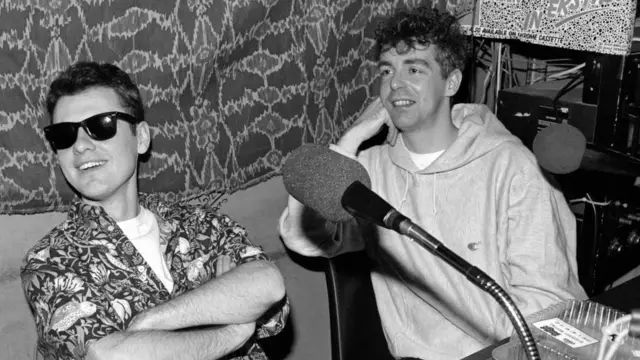“I don’t like spiral staircases,” says Chris Lowe. “And that’s the first time that’s come out in an interview.”
Call it an exclusive. You heard it here first. The Pulitzer is in the post.
The revelation comes as we discuss the origins of the Pet Shop Boys, one of the UK’s most important and influential bands.
This year marks the 40th anniversary of their debut single, West End Girls – a claustrophobic trawl through London’s nightlife that launched a four-decade voyage into smart, irresistible pop.
But before they were Pet Shop Boys, the duo had other lives. And that’s where we join them, reminiscing about the days before they bumped into each other at a Chelsea electronics shop and a musical partnership was born.

Neil Tennant, erudite frontman and lyricist-in-chief, grew up in Newcastle, attending the strict, all-boys St Cuthbert’s Catholic School that later inspired songs like It’s A Sin.
Aged 18, he left to study history in London before taking a job at an insurance office. It was the height of the glam rock era, and he embraced the androgynous look of his musical hero, David Bowie.
“I used to walk down the Kings Road in a white tank top and women’s shoes with big platform heels,” he recalls. “Gay men used to make comments as I walked down the road.”
“That’s how you dressed for work in the insurance brokers?” asks his bandmate, apparently hearing the story for the first time.
“The guy I worked for was very gay,” Tennant explains. “He’d lived through the ‘60s and he used to take me out for lunch and tell stories about The Rolling Stones.
“I think he might have had a thing for me, but I didn’t realise it at the time.”
Lowe, meanwhile, was in Liverpool training as an architect, incubating his dislike of twisty stairs (the geometry is fiendishly difficult, apparently).
“Every so often, you’ll go into a hotel room and it’ll have two levels joined by a spiral staircase,” he observes.
“Well, I can’t stay. I have to walk out.”
After their chance meeting in 1981, the duo started making demos in a studio off Camden Road, paid for by Tennant’s job at Smash Hits magazine.
“Our ambition was simply to make a record with [New York dance producer] Bobby O, and for it to be available on import in the Record Shack shop on Brewer Street,” he says.
They achieved their goal.
Tennant was sent to New York to interview Sting, and used the opportunity to introduce himself to Bobby O.
He agreed to release West End Girls on his own label, and it became a minor club hit in the US and Germany.
By the end of 1984 it was available on import in London, and when the band re-recorded it two years later, it went all the way to number one.
“Radio stations jumped at it because they knew the original and they were eager to play it,” says Tennant.
“And once you’ve started on this journey you want to carry on with it.”

IMAGE SOURCE, GETTY
Fifty million record sales later, the band are about to release their 15th studio album, Nonetheless, which marks a return to the maximalist sound of their heyday, after three records of what Tennant calls “electronic purism”.
Strings grace every track, from the soaring love song Feel to the stately groove of Love Is The Law.
A sense of hope and possibility infuses the record – paradoxically so, given that it was written during the Covid lockdowns of 2020 and 2021.
“I’d just moved into a new house and I felt quite euphoric about it, really.
“Dancing in my kitchen, walking in the countryside… The pressure of our life had been removed.”
Isolated at home, the duo traded demos over email. Tennant even downloaded GarageBand and learned to record his own vocals for the first time.
Leave a Reply